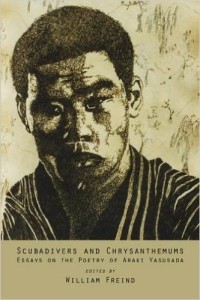Recently, there was a literary scandal when a poem by Yi Fen Chu, chosen for inclusion in Best American Poetry 2015, turned out to be written by Michael Hudson, who said the poem had been rejected 40 times when submitted under his own name; he then got the idea of the Yi Fen Chu alias. Under that name, Prairie Schooner accepted the poem and it made it to the “best” volume. It’s pseudonymity highlighted the current literary bias towards publishing minority, disenfranchised, or foreign writers.
 In the discussion, an older, more complex work came up: the two volumes, one of letters, one of poetry, allegedly by a Japanese survivor of Hiroshima, Akiri Yasusada, whose family was devastated by the blast.
In the discussion, an older, more complex work came up: the two volumes, one of letters, one of poetry, allegedly by a Japanese survivor of Hiroshima, Akiri Yasusada, whose family was devastated by the blast.
After high profile reviews and excerpts from the volumes, his identity turned out to be the biggest literary fraud since Thomas Chatterton’s impersonation of Thomas Rowley, an imaginary monk of the 15th century, complete with fragments on parchment. But was it a fraud, or a construct designed to be discovered? Continue reading “Haiku by whom?”